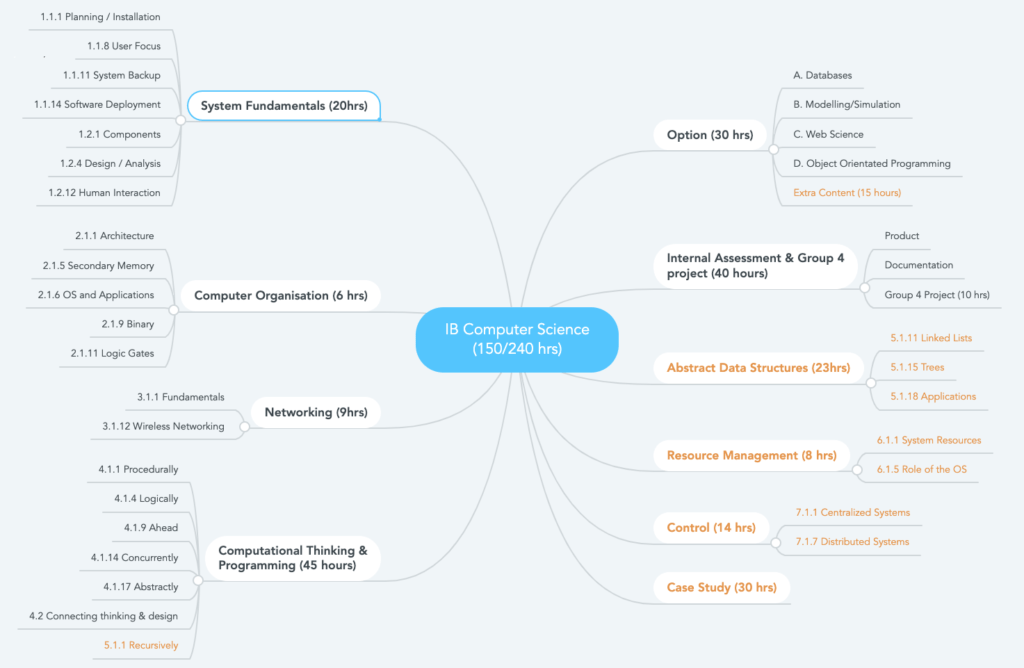Learnlearn.uk / IB Computer Science
Unit 1
Unit 1 – Computer Systems
- Planning / Installation
- Identifying the context
- Change management
- Compatibility Issues
- Local vs Remote Solutions
- Software as a service (SAAS)
- Installation Processes
- Data Migration Issues
- Methods of Testing
- Choosing Test Data
- System updates and maintenance
- User Focus
- Documentation
Training
- System Backup
- Causes of data loss
- Consequences of data loss
- Preventing data loss
- Security, Privacy & Integrity of Data
- Online, Offline, Onsite & Offsite Backups
- System Design & Analysis
- Identifying Stakeholders
- Obtaining Stakeholder Requirements
- System requirements research
- System design & develoment documentation
- Prototyping & iteration
- End user Involvement
- Social & Ethical Consequences of new systems
- Human Interaction
- Designing for usability
- Designing for accessibility
Unit 2
Unit 2 Computer Architecture
- Computer Architecture
- Computer Architecture
- Machine Instruction Cycle
- Primary Memory (RAM,ROM,Cache)
- SRAM vs DRAM
- Secondary Memory
- Magnetic Storage Devices
- Optical Storage Devices
- Solid State Devices
- Operating Systems
- Operating Systems
- Applications
- GUI Interfaces
Unit 3
Unit 3 – Networking & The Internet
- Network Fundamentals
- Types of Networks
- Circuit Switched vs Packet Switched Networks
- Data, Segments, Packets & Frames
- The Internet & World Wide Web
- Intranet & Extranet
- Virtual Private Networks
- Client Side & Server Side Scripting
- Network Standards & Protocols
- Network protocols
- IP Addresses, MAC Addresses & NAT
- URLs & DNS
- Network layers and the OSI Model
- Data Compression
- Error Checking
- Collision Detection
- Automatic Repeat Requests (ARQs)
Unit 4
Unit 4 – Algorithms & Algorithmic Thinking
- Connecting Thinking & Design
- Sequential (Linear) Search
- Binary Search
- Bubble Sort
- Selection Sort
- Merge Sort (Higher Level)
- Big O Notation, Time Complexity and Space Complexity
- Flowcharts
- Pseudocode
- Thinking Recursively (Higher Level)
- Introduction to Recursion
- Programming Resources
- Approved Notation
- Line By Line Interpreter (useful for debugging and visualizing data structures / loops)
Unit 5
Unit 5 – Advanced Data Structures
Static vs Dynamic
Unit 6
Unit 6 – OS & System Management (Higher Level)
- Role of the Operating System in System Management
- FCFS & EASY Backfilling Scheduling Algorithms
- Round Robin Scheduling
- Java Virtual Machine
- Virtual Memory & Paging
- Virtual Machines
Unit 7
Unit 7 – Monitoring and Control Systems (Higher Level)
IA
Internal Assessment & Group 4 Project
- Internal assessment guide
- https://nailib.com/blog/ib-computer-science-ia
- Past submission Marked & Moderated Examples
- https://www.clastify.com/ia/computer-science
- Moderation Guidelines
- Components
- Part A – Planning
- Part B – Part B – Record of Tasks and Design
- Part C – Development
- Part D – Functionality and extensibility of product
- Part E – Evaluation
EE
Extended Essay
Databases
Option A – Databases & SQL
- Basics
- Databases & Information Systems
- Types of Database System
- Database Transactions
- Database Transaction Terminology
- Database Concurrency Control
- Database Definition Language
- Database Manipulation Language
- Data Verification & Validation
- Data Integrity
- Database Management System
- Database Administration
- Database Administrator
- End user interaction
Case Study
Case Study (30 hours) (Higher Level)
Course Overview
Course Overview
Resources
Resources
- AI Assisted Teaching Resources (Flashcards, Loopcards, Presentations, Quizzes)
- Full Syllabus
- IB Computer Science YouTube video playlist
- https://ibcomputerscience.org/
- IB Core Computer Science Text book
- IB Advanced Computer Science Text book
- IB Computer Science Revision Guide
- Programming Skills Tick List
- Level Grade Descriptors
- Past Papers
- Standard Level
- Higher Level
- Future Syllabus
- Overview

